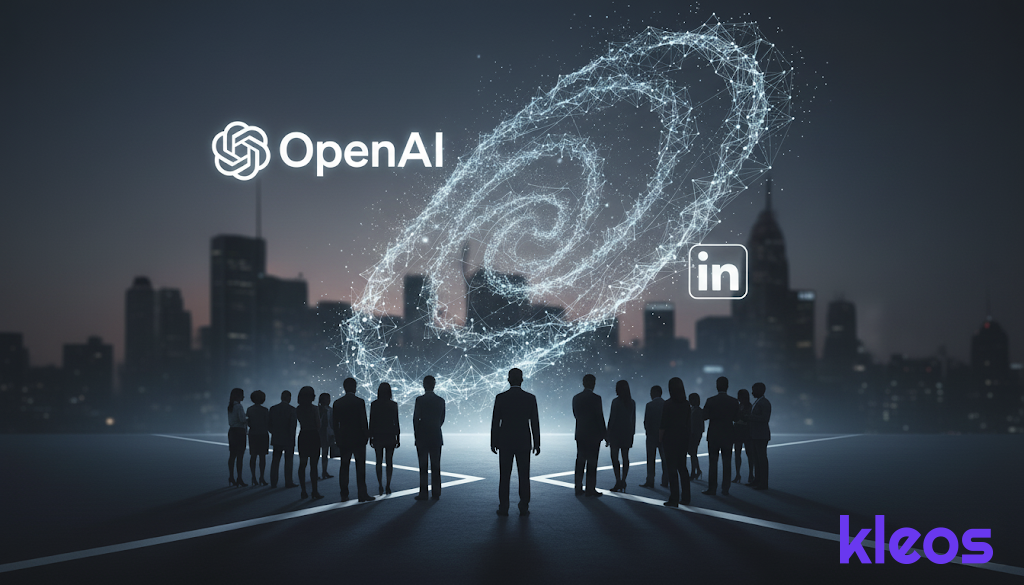Is OpenAI Gunning for LinkedIn?

It’s been quite a while that LinkedIn has reigned supreme in the world of recruitment, but is it time for a new world order? The reign of LinkedIn in recruitment has been long, but a new era is dawning. With the impending launch of OpenAI’s "Jobs Platform" (such creative name, I know), a significant disruption in talent management is inevitable—a development I’ve anticipated for a decade.
Unlike LinkedIn’s network-driven model, OpenAI’s new platform will match candidates to companies through AI-driven skills alignment (based on demonstrated competencies rather than resumes and connections), while simultaneously scaling its OpenAI Academy certification program (with a goal of certifying 10 million Americans in the next five years) and partnering with major employers like John Deere and Walmart.
There’s a lot to unpack here.
For job seekers, it will be even harder to opt out of using AI. Literacy and certifications are employability currency, and given the turbulence of today’s market, every credential counts. This will also cause a shift that focuses more on demonstrable skills and less on pedigree.
At first glance, this seems like a democratizing move. A self-taught candidate who has worked to get the right certifications can now compete with someone who comes from a top-tier school. But if you don’t, or can’t, use new tools, you’ll fall behind. In my opinion, traditional barriers like socioeconomic status and education aren’t disappearing; they’re just changing shape. Certifications only complement education and experience by potentially quantifying knowledge but a person cannot possibly be represented by just a certificate.
For businesses, this is both a challenge and an opportunity. Incorporating OpenAI Academy certification programs directly into corporate training programs can fast-track workforce upskilling and potentially level out the playing field for certain types of positions.And for smaller business and local governments, they’re gaining scalable access to a much larger AI-literate talent pool. However in this new era, organizations that are not AI-savvy enough to integrate new tools will be left scrambling.
We also need to look at the ethics at play here. OpenAI will be doing both the training, and the jobs matching through its certifications. It is setting the standards for AI fluency, and then funneling those certified individuals into its own jobs marketplace. Who decides which competencies matter most? What checks and balances are in place to ensure transparency and inclusivity? Is it truly better to find a certified candidate, rather than someone with a real track record of success? For one organization to both create the tools and gatekeep the outcomes is certainly something that needs oversight.
Meanwhile, LinkedIn’s subscription model was obviously at risk, even before Fidji Simo’s announcement last week. Its subscription-driven model is already under pressure. Recruiters, a primary source of income in this model, are being cut in large numbers. On the flip side, job seekers are increasingly skeptical of the ROI of paid tiers, and in the current job market, many are shifting into gig work (a sector that LinkedIn has historically struggled to serve).
Premium memberships are still climbing, but we may be reaching subscription saturation. And with OpenAI offering an alternative that is built around measurable outcomes and active matching, LinkedIn’s “network-first” value add looks outdated. If there was ever a moment for the competition to strike, this is it - and OpenAI is clawing at the status quo.
If OpenAI succeeds, recruitment may shift from a social ecosystem to a more competency driven marketplace. Those endless filler posts on your LinkedIn feed (not this one, obviously!) are just driving home that LinkedIn is, at its core, a social media company. Is that going to cut it? Is there room for other players to become the primary way to find or fill a job? I believe there is, and every type of established player will be tested, not just because of OpenAI, but because of the radical change in how every business is conducted.
For me, this moment is less about LinkedIn potentially losing ground and more about a new framework emerging within talent ecosystems. It’s not only about who can build a better jobs platform, but it’s also about how organizations adapt to a reality where AI is changing the very infrastructure of employment.
